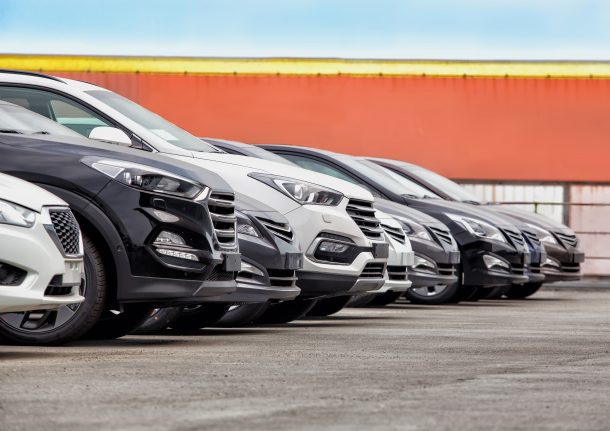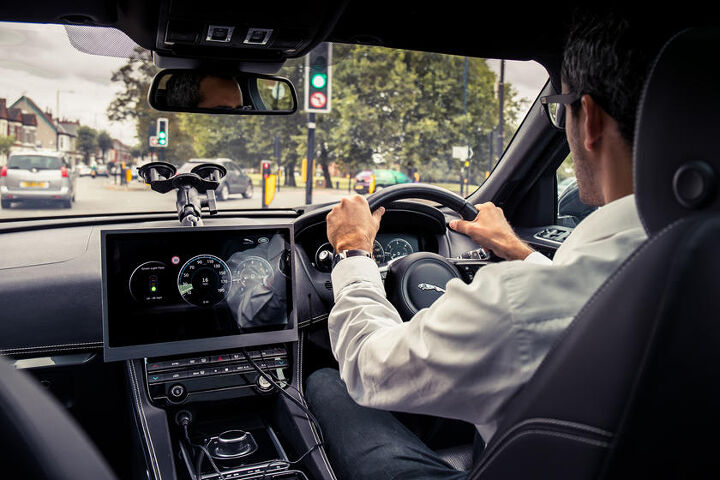#Data
Insurance Companies Are Keeping Tabs on How Often You Use Your Phone Behind the Wheel
With mobile phones now a ubiquitous part of modern-day life, distracted driving has ballooned into a legitimate public safety problem. Alarming studies continue to pour in, with many claiming that driver cell phone use is likely underreported by authorities in crash reports. It’s hard to quantify, especially since nobody wants to admit that their moment of weakness may have contributed to an accident.
Add in a National Highway Traffic Safety Administration survey that found 30 percent of drivers aged 21 to 34 believe texting doesn’t negatively impact their driving, and you’d be forgiven for picking up your keys with sweaty palms.
A new study claims the issue has only gotten worse, with drivers spending more time on their phone than ever before. However, the way the data was acquired is disconcerting in itself. Insurance companies are tapping traffic data startups to monitor people’s phones, and they’re already capable of tracking millions of American devices.
The Kids Aren't Alright
For roughly the last decade, we’ve heard the motoring media bemoan Millennials as the generation that snubbed driving. Their inability to find and hold jobs that paid as well as their parents’ did at the same stages of life, combined with elevated costs of living and crippling student debt load, negatively impacted their purchasing power. Still, this generation might be just the tip of an iceberg the industry’s about to careen into.
As it turns out, Generation Z might even be less interested in cars. In addition to facing similar financial constraints as their older peers, most of them aren’t even bothering to get a driver’s license.
Wrecked Cars Are Now a Treasure Trove of Personal Information
As cars grow more dependent upon computer-controlled driving aids and automakers implement permanent internet connectivity, we’ve grown increasingly concerned with how automakers handle their customer’s data.
It sounds conspiratorial, but there’s a series of events to hang the tinfoil hat on. In 2017, General Motors announced it had successfully monitored the listening habits of 90,000 motorists in a study aimed at improving marketing insights. It also rejiggered OnStar and introduced the Marketplace app for seamless in-car purchasing options. Our take was that it was as impressive as it was ominous — and GM is only leading the charge into a what analysts believe will eventually become a multi-billion dollar industry.
Naturally, this led to privacy concerns over how automakers will protect customer data on future models. But we might want to start worrying about the cars we have now. A couple of white-hat hackers (those are the good ones) recently probed the internal computer networks of wrecked and salvaged Teslas and found a mother lode of personal information waiting inside.
Parents Are Buying Loads of Cars for Their Adult Children
It looks as though more parents are increasingly paying for the transportation needs of their (sometimes very old) children.
Thanks largely to abandoning the important job of parenthood, a Bank of America survey a discovered small portion of adults between age 23 and 37 are now able to put away legitimate savings. However, the prevalence of student debt, low-paying jobs, and an increased cost of living has left many to continue scrimping and saving. In fact, most Millennials under 24 had less than $1,000 in their savings accounts, with nearly half having no savings at all. The former was also true for older members of the same generation. On average, it’s presumed that Millennials are earning 20 percent less than their Boomer parents at the same stage in life — despite being better educated, overall.
That’s causing future issues for the automotive industry. When Bankrate surveyed Americans to get their financial priorities on record last month, 23 percent of respondents specified that student-loan debt directly influenced their decision to delay purchasing a new car. Considering both monthly payments are frequently set to the tune of hundreds of dollars, that would make a lot sense.
Automakers Helping China Spy on Drivers: Report
As concerns grow about the Chinese government’s technology-driven “social credit” system of controlling its citizens, the Associated Press reports that the country, through regulations for electric vehicles, is requiring global automakers to supply telemetric data from their vehicles that could help the one-party state spy on its people.
American, German, and Japanese automakers, including General Motors, Ford, Tesla, Daimler, BMW, Nissan, and Mitsubishi, are among 200 manufacturers whose products must transmit location information and dozens of other pieces of driving data in real time that ultimately end up in monitoring centers that can report that data to the Chinese government.
Putting a Stop to Stopping: Jaguar Land Rover Testing Green Light Speed Advisory Tech
Jaguar Land Rover has announced it will implement Green Light Optimal Speed Advisory (GLOSA) technology on a trial basis. The system utilizes vehicle-to-infrastructure (V2X) connectivity, allowing cars to “talk” to traffic lights while informing drivers of the speed they should travel to avoid having to stop.
GLOSA isn’t a new concept. In fact, it’s been kicked around for years as a potential way to minimize congestion and improve urban traffic flow. The theory involves creating a network of traffic signals that perpetually communicate with connected automobiles and encourage the vehicles to self-regulate their speed. The system works with timed signals, though implementing adaptive signals is believed to further improve the system’s overall benefits.
What Does Ford Look Like As a Mobility Company?
These days, every automaker is in the midst of a metamorphosis, eager to emerge from their chrysalis as a “mobility company.” Even brands that don’t seem bent on completely revolutionizing their business model now use the term in reference to themselves.
Ford, which has positioned itself as a mobility company ever since Mark Fields was steering the ship, is among those pushing the narrative the strongest. Fields may have been fired for having a lofty, tech-focused vision that couldn’t charm investors, but much of it carried over to Jim Hackett’s tenure as CEO. Ford desperately wants to be seen as a cutting-edge nameplate.
However, the assumption among industry experts is that it’s lagging behind General Motors in terms of autonomous driving, electrification, and the ability to tap into alternative revenue streams. We sometimes wonder how accurate those assumptions are.
Auto Coalition Joins Forces With NATCO to Rethink City Streets, Share Driving Data
The National Association of City Transportation Officials (NATCO) has joined Ford, Uber and Lyft to work with the data platform SharedStreets to glean a better understanding of America’s infrastructure. Their collective goal is to “make it easier for the private sector to work with cities around the world and leverage data to improve urban mobility.”
That means different things to different companies. For Uber and Lyft, aggregate data on passenger pickups and drop-offs could be useful in deciding where to deploy their vehicles. The information could also prove helpful in telling city planners how to best manage traffic patterns. Uber also said it would track speeders and what on types of roads people are more apt to drive dangerously.
Should Police Have the Ability to Track and Disable Self-driving Vehicles?
Autonomous vehicles have created an endless series of unanswerable questions. As the technology continues to advance, decisions on how best to implement it have not. We’ve yet to discern who is liable in the event of an accident, how insurance rules would change, if they can coexist effectively with traditional automobiles, how they will impact vehicle ownership in the long term, and the infrastructure necessary to ensure they’ll function as intended.
There’s also a myriad of security concerns involving everything from the very real prospect of vehicle hacking to automakers selling the personal information of drivers. Both of those topics are about to come to a head as automakers continue shifting toward connected vehicles.
In March, the U.S. Transportation Department met with auto industry leaders, consumer advocacy groups, labor unions, and others in an attempt to navigate the minefield that is autonomous integration. The department previously hosted similar roundtable discussions in December after releasing the new federal guidance for automated driving systems, called “ A Vision for Safety 2.0.” That guidance freed up automakers and tech firms to test self-driving vehicles with fewer regulatory hurdles to cope with.
However, the December report seemed to focus mainly on how little everyone outside the industry understands the new technology.
Super Cruise Coming to Rest of Cadillac in 2020, Conspiracy Theories Coming by 2023
General Motors intends to start offering its hands-free driving system, Super Cruise, across the entire Cadillac lineup by 2020. The technology, already available on the CT6, allows motorists to take a semi-passive role on the highway. Once GM’s luxury brand is sorted, the system will become available on other makes.
If you like the idea of a car that can take you out of the commute a bit and don’t mind the idea of a small camera permanently pointed directly at your face, then this is probably very exciting news.
While Super Cruise is frequently compared to Tesla’s Autopilot, the two operate differently. General Motors’ system does indeed allow for a similar hands-free experience, but the onboard camera tracks the driver’s eyes to ensure they remain relatively attentive to the road ahead. Meanwhile, Autopilot allows drivers to ignore almost everything so long as they’re willing to regain control of the vehicle when asked. The difference between the two is that the onus of safety remains slightly more with the driver with Super Cruise.
Yes, Your Autopilot-Equipped Tesla Will Film a Crash
It’s common knowledge that Tesla vehicles store and transmit data back to the company’s Fremont, California home base, but a hacker working on a wrecked Model S just discovered something startling.
In an interview published by Inverse (h/t to Hybrid Cars), North Carolina computer programmer Jason Hughes claims that Tesla’s Autopilot system actually records video. While working on a center display unit from a wrecked Model S, Hughes found footage of the vehicle’s crash.
NSA in Your NSX: Your Car is a Data Breach Waiting to Happen
Your faithful four-wheeled companion — the one that costs you an arm and a leg but you still love it — has the data-gathering potential to make your life a Kafkaesque nightmare.
Researchers have found that a car’s computer network can identify a driver just by the way they operate the vehicle. Even something as simple as the brake pedal can pinpoint who’s behind the wheel, according to a report published in Wired.
'Defeat Device' PowerPoint Presentation is Volkswagen's Latest Embarrassment
If you want your nefarious plan to stay on the down low, try not to make a PowerPoint presentation on it.
That’s an obvious takeaway from the New York Times report that details a bombshell discovery made by investigators probing documents and laptops related to Volkswagen’s diesel emissions scandal.
Mitsubishi Fudged Japanese Mileage Data Since 1991
Mitsubishi’s fuel economy scandal blew up yesterday after the automaker admitted it has issued misleading mileage data since C+C Music Factory was at the top of the charts.
The scandal that started with inflated mileage numbers on a single minicar one week ago now extends to all Japanese market Mitsubishi vehicles sold over the past quarter century. Reuters is reporting that the automaker compiled fuel economy data using U.S. standards, rather than the Japanese standards that factor in much more city driving.
Toyota Embraces Big Data (Science), Spins Off a Company
Your vehicle’s technology is enslaving you, and Toyota wants to help you break free.
Today, Toyota has become the latest automaker to create a subsidiary tasked with generating new technology and innovation for its parent company.
Called Toyota Connected Inc., the venture is a collaboration with Microsoft that will serve as a data science and mobile technology hob for the world’s largest automaker. The plan is to use Microsoft’s Azure cloud technology to “humanize” the driving experience and make vehicles’ high-tech abilities less intrusive and more useful.






























Recent Comments